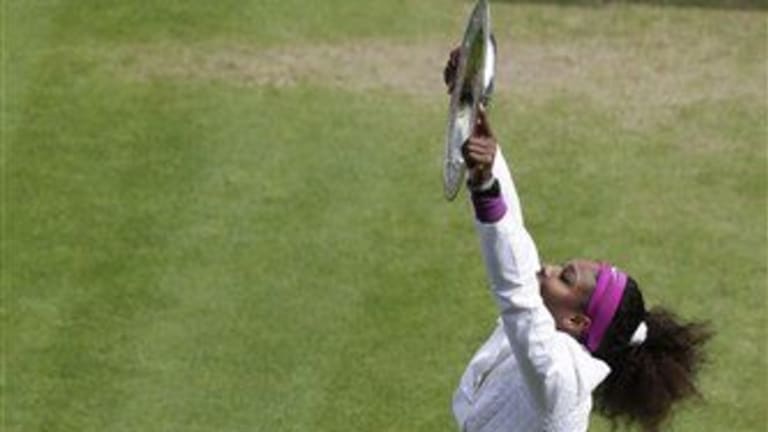In another way, though, this was a different Serena from the one we had seen in the past. The only time I can recall her panicking—Serena’s word—while trying to close out any match, the way she did trying to finish the final against Agnieszka Radwanska, was in her first-round loss to Virginie Razzano at Roland Garros last month.
What’s important isn’t that Serena showed vulnerability again. It’s that this time she had the resources to do something about it. We think of her as a power player, and she is. But in the third set against Radwanska, she realized that her normal power game was going to be too risky for where she was mentally, against this clever opponent, on this occasion. So she slowed down, played with more control, regained her confidence, and won going away. On the final shot, she let loose with a vintage backhand winner down the line. New Serena, meet old Serena. You should make a formidable team. A+
Jonny Marray
I had never heard of the 31-year-old Englishman before, and when I saw his name on Twitter last week, I assumed that the first “a” in his last name was meant to be a “u.” I was amazed by his out of nowhere, wildcard doubles title with Frederik Nielsen of Denmark, which made Marray the first Brit to win the men’s doubles since 1936.
Marray topped himself in my eyes when, in the third-set tiebreaker in the final, he hit the net with his racquet on a volley, stopped the point, and told chair umpire Eva Asderaki, who hadn’t seen the infraction, that he was conceding the point. It was the right thing to do, the only thing to do, but it was still a shock to see that kind of pure sportsmanship in such a pressurized moment. Fortunately, this was one good deed that went unpunished. Marray and Nielsen won the tiebreaker, and the match. Good, good show. A+
Andy Murray
Murray was right, in his sober assessment after the tournament, that once the tears and cheers had ended, the “main thing” was that he had played better in a major final than he had before. Just a single set better, yes, but he has to take it one small step at a time against the Big 3.
The fact that Murray became the first Brit to make the Wimbledon final since the 1930s obscured the fact that all he had really done was go one round farther. He hadn’t beaten any of the players who typically beat him at the Slams—Nadal, Djokovic, or Federer. Still, there was progress, in the way he hung in against iron man David Ferrer, and the way he put together two of the best sets of his career against Jo-Wilfried Tsonga in the semis, came down to earth, yet still found a way to win. It wasn’t the pressure of the moment that eventually got to Murray, but the pressure from his opponent in the final. He might have seized his second-set chances against Federer, it's true, but after that there wasn't a whole lot he could have done. Murray at his best is not as good as Federer at his best.
Along the way, though, Murray made the tournament more fun—more mad. When it was over, he apologized to Federer for crying, saying that he didn’t mean to take over the moment. Murray didn’t need to apologize. Federer of all people knew the tears were genuine and uncontrollable, and we knew how much of his heart Murray had put into it, for himself and his team and everyone watching in Great Britain. I was impressed with the way Murray held his own against Federer. I was just as impressed that he held his own, and kept it together, against those other final-day opponents that every loser must face at Wimbledon, Sue Barker and the listening world. A
Agnieszka Radwanska
She won’t always get a draw like this—no Vika, no Maria, no Petra, Venus bowing out a round before they were supposed to play. But Radwanska put a needed stamp of Grand Slam legitimacy on her year-long rise in the rankings, and she showed that when they’re done right, there’s always a place in tennis for finesse, touch, craft, and old-fashioned court sense. I’m glad she made the final competitive, and I’m glad she’s not going to be No. 1 without a Grand Slam title. That’s the last thing any player needs. A
!JmESPN
The network broadcast Wimbledon from start to finish for the first time, and it rose to the occasion. Two channels on the dial gave it much more flexibility in what it could show, and if you were lucky enough to be able to see the half-dozen other matches on ESPN3 online during the day—a big if, I know—you really did feel like you were there. I would never have seen Jonny Marray’s great sporting gesture if the network hadn’t stayed live on the men’s doubles final on Saturday afternoon, even when there were no Americans involved.
ESPN will never do it exactly as we hardcore fans would like. The commentators still talk too much—nothing is left unsaid—and while one of its outside studio pros (Mike Tirico) was a good fit, another (Hannah Storm) wasn’t. I was torn by the feature on Andy Murray’s hometown of Dunblane, and the school murders that he survived. On the one hand, it was powerful and well-made. I’d never seen Judy Murray talk about that day, let alone Murray’s grandparents. Everyone in the town came off as extremely dignified—I doubt anyone watching wasn’t in tears. But seeing it during the rain delay in the middle of the final left me with a weird and solemn feeling through the rest of the match. I wish I had caught it another time.
Still, this was a tremendous, overstuffed Wimbledon, and ESPN’s all-out effort for two weeks did it justice. That’s saying something. A
I'll be back tomorrow with the rest of the best, and worst, from the A-minuses on down.

